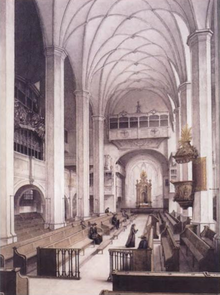Sie werden euch in den Bann tun, BWV 44
| Sie werden euch in den Bann tun | |
|---|---|
| BWV 44 | |
| Church cantata by J. S. Bach | |

Thomaskirche, Leipzig
|
|
| Occasion | Exaudi, Sunday after Ascension |
| Performed | 21 May 1724: Leipzig |
| Movements | 5 |
| Cantata text | anonymous |
| Bible text | |
| Chorale | Paul Fleming |
| Vocal | SATB soloists and choir |
| Instrumental |
|
Sie werden euch in den Bann tun (They will put you under banishment), BWV 44, is a church cantata by Johann Sebastian Bach. He composed it in Leipzig for Exaudi, the Sunday after Ascension, and first performed it on 21 May 1724.
Bach wrote the cantata in his first year in Leipzig for the Sunday Exaudi, the Sunday after Ascension. The prescribed readings for the Sunday were from the First Epistle of Peter, "serve each other" (), and from the second Farewell discourse in the Gospel of John, the promise of the Paraclete, the "Spirit of Truth", and the announcement of persecution (). The unknown poet begins with a quotation from the Gospel. One year later, poet Christiana Mariana von Ziegler would begin her cantata text for the same occasion, Sie werden euch in den Bann tun, BWV 183, with the same quotation, but other than that, the two works have little in common. The poet reflects the persecution of the Christians, confirmed by a chorale as movement 4, the first stanza of Martin Moller's "Ach Gott, wie manches Herzeleid". In movement 5 the poet gives a reason, the Antichrist even thinking to work for God by fighting the Christians and their teaching. In movement 6, the suffering ones are promised God's help. The closing chorale is the final stanza of Paul Fleming's "In allen meinen Taten".
Bach first performed the cantata on 21 May 1724. It is the last original cantata composition of his first annual cycle, followed by reworkings of older music until the beginning of the second annual cycle of chorale cantatas on the first Sunday after Trinity.
...
Wikipedia
